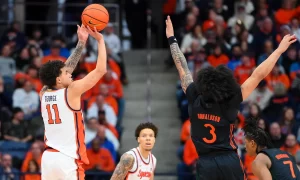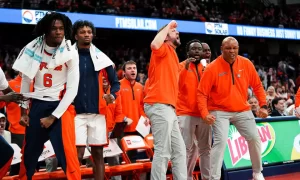Super Bowl: more than just a game
Let’s take a look at the Super Bowl, the sport’s answer to the Oscars, just with more tackles and fewer tearful thank-you speeches. Once Upon a time it was about two teams fighting over an oval ball. Now? News about the announcement of the line-up of those who will perform during the half-time show often attracts more attention than the game itself. Moreover, the stars like The Weeknd are ready to spend personal money to make the performance unforgettable.
If you disagree, then try to remember the last final without using the internet. Or was it just as much the halftime show with big stars like Usher or Kendrick Lamar that caught your attention? Some experts believe that this strategic move increases the NFL’s reach and appeal to a wider audience. Fans of other popular sports leagues, such as MLB, would support this strategy and would love them to be implemented in their favoured game too. Besides, using 1xbet download to install a betting app and place a wager might be entertaining, but watching the game, complemented by the half-time show with the world-renowned artists is 100 times better.
This fusion of sports and music during the Super Bowl shows how leagues leverage entertainment to create a more engaging experience. It is possible that this also affects how future sporting events will be produced and presented.
NBA All – Star Game: a celebration of sports and stardom
The NBA is not far behind. Their All-Star game has turned into a party where sport meets glamor. This makes the event a celebration that extends beyond basketball.
There is a debate as to whether these entertainment elements take the focus away from the sport. Some fans love the extra show, while others prefer a more traditional approach. Either way, it’s clear that the NBA uses entertainment to increase engagement and create a unique experience.
As a fan, consider: how does this mix of sports and entertainment affect your experience? Do you feel more engaged or do you miss the focus on the sport itself?
Athletes as entertainment moguls
It’s not just the leagues that mix sports and entertainment. The athletes themselves have become big players in the entertainment industry. Take LeBron James for example. He produces films, television shows and digital media, often focusing on societal topics.
LeBron is not alone, with Serena Williams, Tom Brady, and Kevin Durant also trying themselves in different production industries. However, others, like Martin Braithwaite, prefer a more traditional approach and go straight for the business opportunities.
This trend shows that athletes are leveraging their platforms to influence culture on multiple levels. Some experts see this as a positive development that gives athletes more control over their image and messages. However, there are also those who believe that it can distract from their performance on the field.
Social media: the direct line to the fans
Social media has allowed athletes to communicate directly with fans. Cristiano Ronaldo, as a prime example, crushed some records when he appeared on Youtube as the fastest-growing channel. If Ronaldo were a country, his population would consist mainly of people who like pictures of his six-pack. It would be a very well-trained, but possibly not very productive society.
But there is a debate about whether this constant presence on social media is beneficial. Some believe it strengthens the bond between fans and athletes. Others fear that it takes the focus off the sport. But it seems that in this day and age we just need to get used to it.
Esport: the ideal mix of sports and entertainment
This relatively new form of competition represents perhaps the ultimate fusion of sport and entertainment. Here you can watch young people become millionaires by doing what your parents always said you should stop doing: playing video games all day.
Such a high interest in high-tech and extremely profitable esports raises interesting questions about the future of traditional sports. Will we see a further fusion of physical sports and digital entertainment? Or will they remain separate spheres?
Financial implications: does the money follow the entertainment?
Of course, the increased fusion of sports and entertainment also has economic consequences. Now we see athletes advertising everything from luxury watches to cryptocurrencies. Leagues partner with streaming services on documentary series and reality shows. Even the stadium experience is increasingly gamified with interactive apps and augmented reality features.
Athletes as brand ambassadors and influencers
Modern athletes often act as brand ambassadors and influencers. They use their popularity to promote products, social causes and even political messages. This extends their influence beyond the sport and into societal discussions.
There are different points of view on this. Some see it as a positive use of their platform, while others believe it can create conflict and distract from the sport.
Critical perspectives and concerns
Not everyone is enthusiastic about this development. Some traditional sports fans feel that the entertainment elements take the focus away from the game itself. There are also concerns that commercialization may go beyond the integrity of the sport.
As a fan, you are in the middle of this development. You may have noticed that your experience of sports has become more diverse and enjoyable. But it may also be that you miss a more focus on the game itself.
It may be worth reflecting on what you value most about sports and how these changes affect your commitment. Your feedback and preferences can actually influence how leagues and athletes choose to present themselves in the future.
The role of technology: virtual reality and more
Technology also plays a major role in this development. With virtual reality and advanced graphical presentations, the sports experience becomes more interactive. Soon you might be sitting at home on the couch feeling like you’re in the middle of the pitch. Some futurists even wonder if we will see the emergence of completely new hybrid forms of sports-entertainment, where fans could “participate” in the game.
It sounds exciting, but it also raises new questions. Will the technology improve our experience or will it create a distance to the real game? Further research and development will lead the way.
Final reflections
With time, the line between sports and show business becomes more and more blurred. Fans get engaged in the games deeper, while the people, who never knew about or weren’t interested in the NBA or NFL, will learn about them through the entertainment news and may become curious. By understanding these dynamics, we can better navigate the modern world of sports and, perhaps, even influence its direction.
As a fan you are encouraged to follow current research projects or participate in debates about the future of sport. Your interest and commitment are part of what drives this exciting development forward.


















